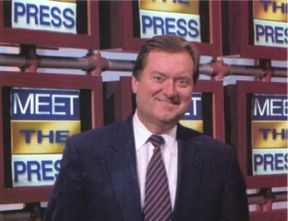Tim Russert: What the Televised Grieving Says about TV News Now (Pssst: It's All about Them)
By Elaine Liner Elaine Liner Archives

Maybe we know too much now about the people who bring us the news on TV. With last weekend’s nearly wall-to-wall coverage of Meet the Press host Tim Russert’s sudden death, we were subjected to the private feelings of a lot of public people. Longtime NBC anchor Tom Brokaw, who broke into network programming last Friday afternoon to report Russert’s death, broke down in tears on the air. So did NBC political correspondent Andrea Mitchell, columnist Mike Barnicle, ABC doyenne Barbara Walters, CBS anchor Katie Couric and others who took part in tributes that ran hour after hour on NBC, MSNBC and other cable channels all weekend and into Monday.
Russert was a respected professional—trained as a lawyer and not as a journalist—but did his passing really warrant this level of coverage? Peter Jennings didn’t receive it when he died a few years ago and he was on the air longer as a reporter and network news anchor. Russert is getting the attention after his death that is usually accorded a president or a pope. One of the talking heads speaking to Keith Olbermann on NBC last night even referred to Russert as “one of our great leaders.”
Come on. It’s a fine thing that so many of Russert’s colleagues held him in high esteem, but many of their sentiments seem more appropriate for private services than for sharing with the public. All that choking and blubbing on Sunday’s hourlong roundtable of grieving on Meet the Press would not so long ago have been considered gratuitous and unseemly—not to mention Monday’s Today Show, which featured a full half-hour of Matt Lauer talking to Russert’s son Luke about his father, who had died just 72 hours earlier. Watching it felt like intruding on a private conversation.
That segment, by the way, led the morning news program on a day when 36,000 Iowans had been forced from their homes by flood waters, the largest number of refugees from a natural disaster in the U.S. since Hurricane Katrina. How did the Russert coverage trump that? It's sad that he died suddenly--of a heart attack while he was at work Friday at the NBC bureau in D.C.--but the extended wake went beyond news and into sanctification.
It also speaks of a creeping and persistent narcissism among the network news shows. We recently had to go through Robin Roberts’ cancer diagnosis and subsequent treatment via Good Morning America and the death of Ann Curry’s father on Today. Devoting airtime to such matters may be deemed “public service” of some sort by the networks, but it actually presumes that viewers care so deeply about the people who read and report the news that we want or need to be there for events in their private lives.
Among the more than 1880 comments on HuffPo’s story about Russert’s death are many entreaties to let the story go, to end the fawning tributes and even to allow a few critics on to balance the coverage. This was, as one commenter pointed out, a man who hired a ghostwriter, Bill Novak, to write a book about his own father, “Big Russ.” There were flaws, too, in Russert’s journalism. His grinning bulldog style on Meet the Press typically amounted to confronting a Cheney, McCain or Obama with past quotes that betrayed some current decision or public statement they’d made. He’d sit back, listen to them defend themselves and then not follow up, moving quickly on to the next “gotcha.”
Not to disparage Russert. He was a good man doing a good job in a tough business for nearly two decades.
But there are a lot of media people, in print and on TV and radio, who’ve done better work and for far longer than he did and odds are they won’t be remembered so fondly or with such extensive fanfare after they’re gone.


